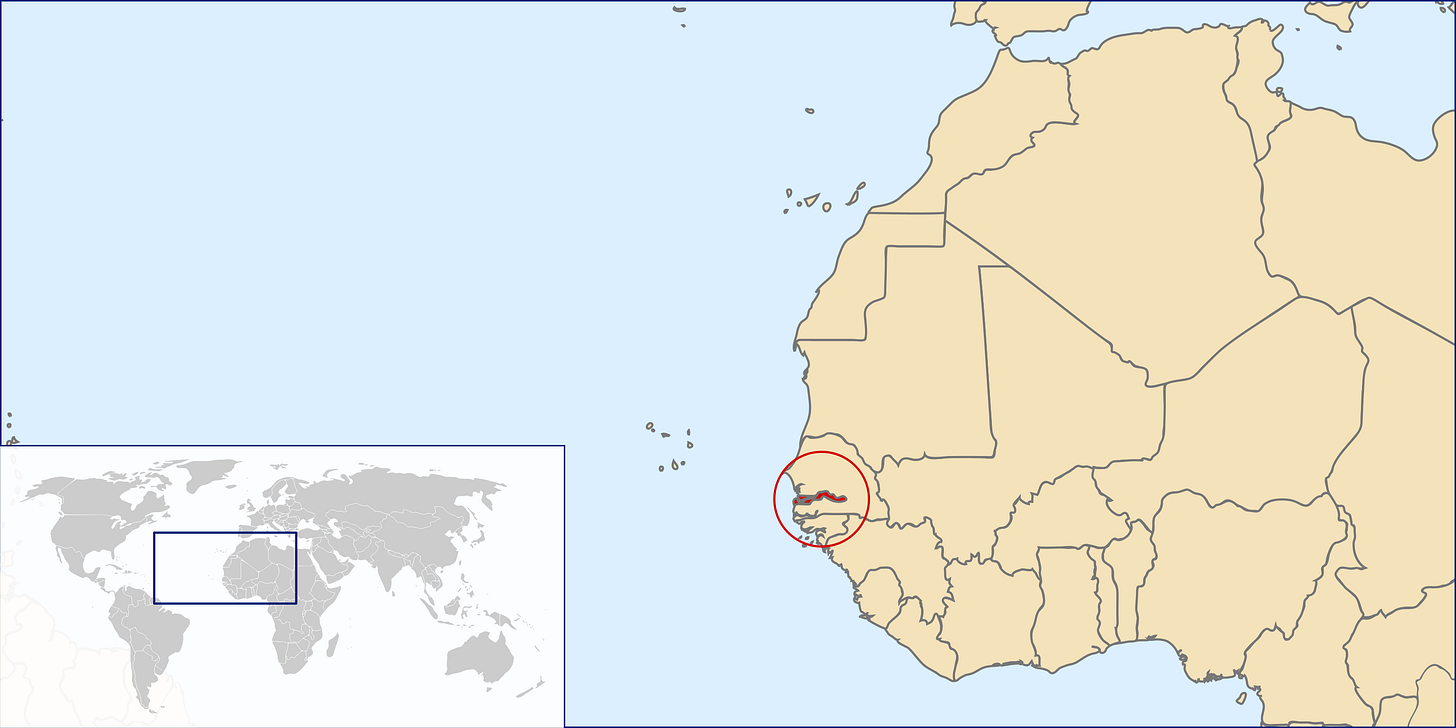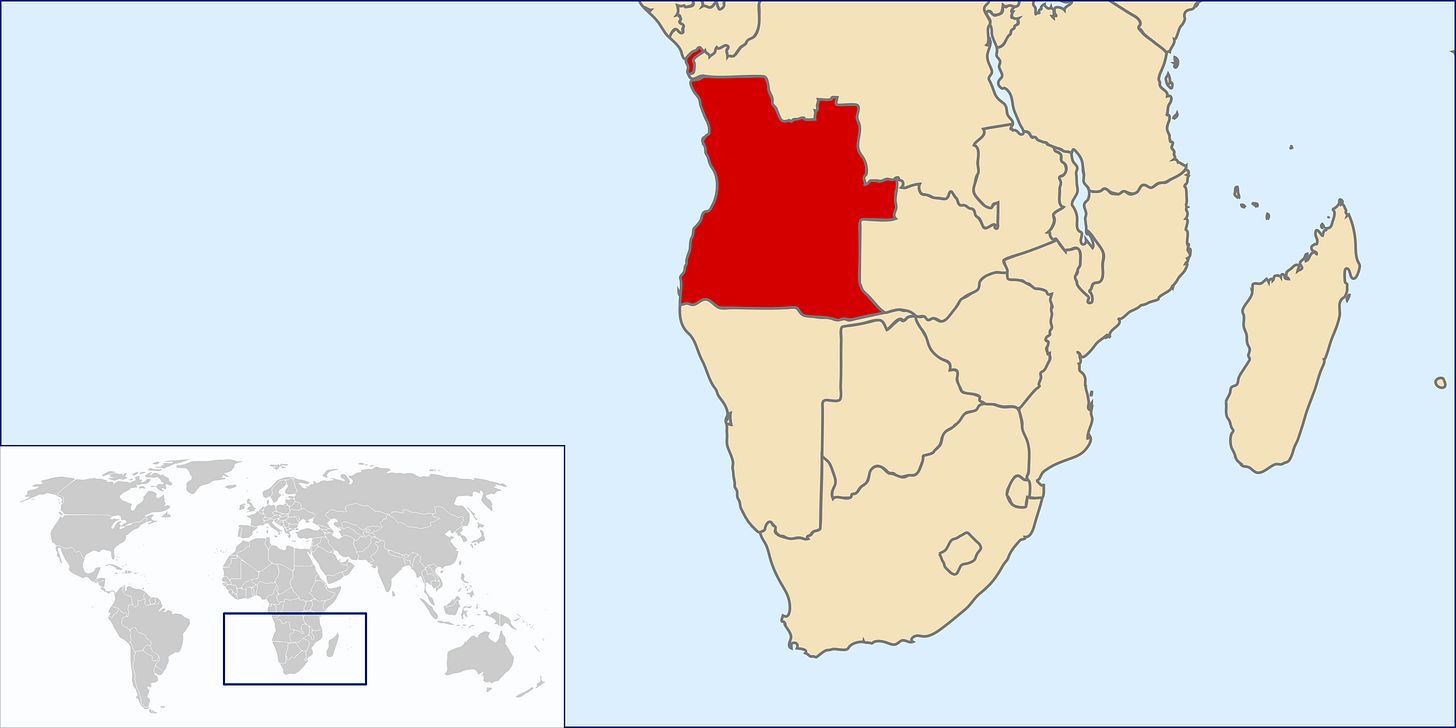
Good morning from… Can you guess where in Africa this is? (Find the answer at the bottom!)
Why Does Africa’s Map Look So… Weird?
Ever stared at a map of Africa and wondered why so many borders are lines so straight you could use them to measure a shelf, while others meander through mountains and rivers at odd angles? Turns out the answer mostly comes down to European powers deciding Africa’s fate at the now-infamous Berlin Conference of 1884-1885. No African delegates were present—naturally—and the result was a patchwork of borders that often ignored local communities. Here are a few highlights of this colonial doodle (courtesy of Al Jazeera):
1) The Bir Tawil Bermuda Triangle (Egypt? Sudan? Nah, you take it!)
In Northeast Africa, a triangle of desert known as Bir Tawil remains unclaimed by Egypt or Sudan. Deciding who owns Bir Tawil also decides who forfeits the more resource-rich Hala’ib Triangle, so neither country wants to be stuck with the relatively useless wedge of sand.
2) The Gambia: Why So Slim?
The Gambia is basically a skinny corridor hugging the Gambia River and sandwiched inside Senegal. Legend has it British ships fired cannonballs to determine the country’s width, but while that tale lacks hard evidence, the truth is just as colonial—Britain wanted control of the waterway for trade, leaving France the rest.
3) Cabinda: Angola’s Little Northern Secret
Angola has a chunk of territory called Cabinda surrounded by the DR Congo and disconnected from Angola proper. Blame Portuguese colonial decisions at the Berlin Conference and the subsequent desire for those sweet, sweet oil reserves. Cabinda has repeatedly clamored for independence, leading to a long-simmering separatist movement.
4) The Caprivi Strip: Germany’s Non-Shortcut
Namibia’s peculiar “panhandle,” the Caprivi Strip, was once Germany’s grand plan to link its then-colonies by navigating the Zambezi River. Alas, whoops, nobody mentioned Victoria Falls—a 108-meter drop that’s not exactly boat-friendly.
5) Lesotho: A Mountain Fortress Inside South Africa
Completely surrounded by South Africa, Lesotho traces its existence back to a savvy move by King Moshoeshoe I, who turned to the British for protection from Zulu and Boer expansions. Lesotho stayed a separate colony and never became part of South Africa—which meant it dodged apartheid and then became a fully independent state in 1966.
6) So. Many. Guineas...
West Africa is home to Guinea, Guinea-Bissau, and Equatorial Guinea—not to mention Papua New Guinea on the other side of the globe. Europeans slapped “Guinea” onto several patches of coastline, and those new states each kept or tweaked the name. Twist: Britain’s old guinea coin was minted from gold dug up in West Africa’s Guinea region.
7) Two Congos: Same River, Different Colonizers
The majestic Congo River divides two nations named after it: the Democratic Republic of the Congo (ex-Belgian colony) and the Republic of the Congo (ex-French colony). Both trace their name to the historic Kingdom of Kongo, but thanks to 19th-century politics, they split into two separate states.
Thanks to a 19th-century land grab, Africa’s borders are a patchwork of lines, enclaves, and strips that sometimes make little geographic sense. Clearly, understanding this history reveals why these lines continue to shape African politics and culture…
The 300-Foot Lifeline: Meet the Crew Keeping Africa Online

Imagine a floating tech hub the size of a football field, roaming African waters to rescue the continent’s frayed online lifelines. That’s basically the Léon Thévenin in a nutshell—a specialized repair ship loaded with more than 50 engineers and technicians whose entire job is to keep your YouTube streams, WhatsApp messages, and online banking purring along seamlessly.
One day they might be off the coast of Ghana; another day, they’re halfway to Madagascar, grappling with a battered cable that, if ignored, could plunge millions into digital darkness.
A year ago, multiple deep-sea cables snapped, sending entire regions from Lagos to Nairobi into a meltdown. Messaging apps froze. Card payments bombed out. Teleconferencing? Forget it. The culprit? Partly anchors, partly fishing trawlers, partly Mother Nature’s storms. But no matter who or what gets the blame, it’s the Léon Thévenin that swoops in to save the day.
“It’s simple: because of me, countries stay connected,” boasts cable jointer Shuru Arendse, a South African who’s been doing this gig for 13 years. He’s the hands-on hero who literally fuses brand-new cable sections onto the damaged bits, a process involving enough patience and steady hands to put neurosurgeons to shame.
The routine goes something like this: an alert rings out (some cable in the Atlantic just died), the crew revs up the Léon Thévenin within 24 hours—though, spoiler alert, red tape can leave them twiddling their thumbs offshore for days. Once on-site, their mission becomes an underwater treasure hunt: a bulldozer-like ROV the size of a small bus descends to the ocean floor, guided by cameras and thrusters. The ROV slices away the busted cable segment, ties it to a rope, and the ship hauls it up. Then Shuru and his fellow “cable surgeons” isolate the problem, splice in a fresh piece (imagine welding, but more fiddly), and gently lower it back into the sea. Voilà, the internet is saved—again.
Of course, maintaining Africa’s 600 or so undersea cables is no nine-to-five. Chief steward Adrian Morgan has missed five consecutive wedding anniversaries. Another guy’s risking skipping his own son’s marriage if the next emergency happens too soon. Even the ship’s chief engineer, Ferron Hartzenberg, acknowledges that while the job is thrilling, half of his life basically unfolds at sea.
Why It Matters
When a single anchor drags along the ocean floor and snaps a cable in, say, East Africa, entire economies can grind to a halt. That’s exactly why this ship and its crew are so essential. They are, in their own words, the link between Africa and the world.
The internet might seem like magic. But behind the scenes, it’s a daily battle at sea—one that a dedicated band of engineers, splicers, and “remote-control bulldozer” pilots fight to keep Africa online. And if that isn’t superhero territory, what is?
All Aboard the Tanzanian Time Machine: Catch the Kigoma Deluxe Before It’s Gone

If you’re the type who thinks “journey > destination,” then Tanzania’s Kigoma Deluxe might just be your holy grail.
For more than a century, this delightfully unhurried train has rattled along an 800-mile path from the coastal bustle of Dar es Salaam to the placid shores of Lake Tanganyika. It’s a 33-hour, creaky, sometimes-chaotic, always-charming tribute to the days when rail travel was actually about seeing the country, rather than just bypassing it at 200mph. But with a new, electrified Standard-Gauge Railway (SGR) already siphoning off impatient travelers, this beloved relic is edging dangerously close to “last call.”
Read this article by the Financial Times to get a vivid glimpse of what the journey is like.
From the rummaging traders who pop up at each station to the unexpected delays (derailments included!), the Kigoma Deluxe offers an immersion into Tanzania’s everyday life that’s becoming rarer by the day.
And if you crave the slower route—and the stories and flavors that come with it—it might be time to climb aboard before the future takes over for good.
Africa in Numbers
🇬🇳 $190 Million IPO: Mining billionaire Robert Friedland’s Ivanhoe Atlantic is raising up to $190M in Australia to develop the Kon Kweni iron ore project in Guinea. He took over the high-grade deposit from a BHP-led consortium in 2019 after years of inactivity. Meanwhile, Rio Tinto’s massive Simandou mine in Guinea is set to begin production this year, shaking up the global iron ore market.
🇿🇦 Trump's Economic Chaos: South Africa’s central bank chief warned that Trump's policies are fragmenting the global economy, raising uncertainty as tariffs hit steel, aluminum, and other markets. Meanwhile, South Africa tried to salvage a G20 poverty summit in Cape Town, with key finance ministers skipping the meeting amid global aid cuts. The US slashed USAID, the UK cut its aid budget by 40%, and trade disputes further derailed progress. Late last week, the Trump administration cut UNAids funding that could result in up to 500,000 deaths in South Africa over the next decade, with another half a million new HIV infections expected due to halted USAID grants.
🇪🇹🇰🇪 Deadly Border Clash: A fight between Ethiopian and Kenyan fishermen near the Omo River left 13 Ethiopians dead and 22 Kenyans missing. The clash erupted on Saturday evening near Lopeimukat and Natira.
🇷🇼 UK Aid Freeze: Britain has paused bilateral aid to Rwanda and imposed diplomatic sanctions over Kigali’s alleged support for M23 rebels in DR Congo. Rwanda slammed the move as “punitive.”
🇳🇬 3.4% Growth: Nigeria’s economy grew at its fastest rate in three years, fueled by Tinubu’s reforms, including scrapping the petrol subsidy and floating the naira. Inflation may finally be slowing. Meanwhile, a Nigerian court seized over $5M and properties linked to former central bank governor Godwin Emefiele, ruling them as "proceeds of unlawful activity." Emefiele, facing fraud charges, denies wrongdoing.
🇸🇩 65 Tons of Gold: Sudan’s gold production hit 65 tons in 2024, earning $1.6B in government revenue as authorities slashed taxes, attracting small-scale miners to the formal market. Deals with China, Russia, and Qatar helped boost output amid war.
🇸🇳🇲🇷 First LNG Cargo: BP’s $4.8B Greater Tortue Ahmeyim project is preparing to export its first liquefied natural gas cargo from Senegal and Mauritania. The tanker British Sponsor is waiting offshore for its shipment.
🇰🇪 Bigger Cargo Planes: Kenya Airways is expanding its freight fleet to tap into rising intra-African trade, adding Boeing 737-300s and eyeing even larger aircraft. The airline posted its first half-year profit in a decade in 2024.
🇨🇩 Mystery Illness Kills 53: A deadly unknown disease, possibly linked to bat consumption, has killed 53 people in the DRC’s Équateur province, with 431 cases reported in five weeks. Meanwhile, over 500 monkeypox (mpox) patients fled clinics in eastern DRC amid ongoing M23 rebel advances. Health officials fear the highly contagious disease, which killed 900 people last year, could spread unchecked.
🌍 $36 Trillion Climate Bill: Africa is owed $36T in climate reparations from rich nations, says ActionAid. Meanwhile, the continent’s $646B debt to global creditors is choking economies. Nine of the world’s ten most climate-vulnerable nations are in Africa, with Chad, CAR, and Eritrea topping the list.
Food for Thought
“Never ask to be told the obvious.”
— Kenya Proverb
And the Answer is…
The photo was taken in the DRC! Did you guess right?




